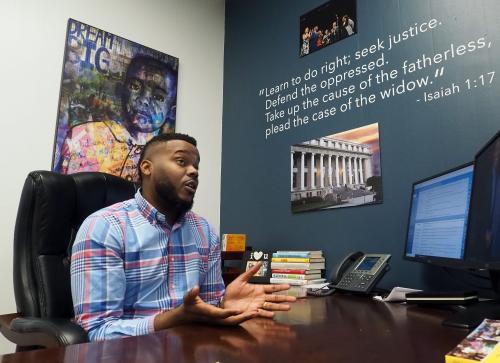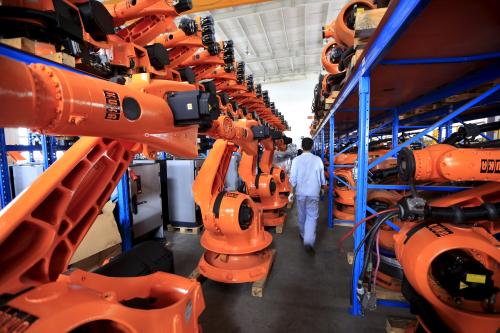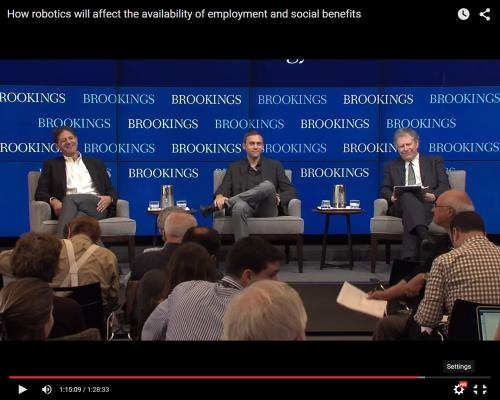Leading Democratic lawmakers have begun proposing several moonshot policies to address economic problems related to technological advances and automation, from large cash transfers to jobs guarantees. The debate swirling around these potential policies has already become oddly heated considering there is little research into how these major reforms would impact the whole American economy, let alone how they could be implemented effectively.
So one new member of the House of Representatives from Silicon Valley, Ro Khanna, has emerged with a novel solution: try out all the reasonable policy ideas and measure which ones are best. Rather than fight over a jobs guarantee or an expanded tax credit, the bill would take a “tech”-like approach to create minimal viable pilots to different ideas, meticulously collect data on their effectiveness, and iterate what works before scaling to a nationwide policy.
Congress has the power to set up large-scale “demonstration” projects that direct an executive agency to facilitate the testing and evaluation of qualifying experiments.
There are already somewhat similar bills to Khanna’s idea, specifically to address challenges posed by the impact of tech platforms. Senator Mark Warner, in collaboration with the Aspen Institute Future of Work Initiative, has a bill to fund $20 million in demonstration projects around the country to test worker benefit packages not attached to any single employer (“portable benefits”) in order to help the growing legion of Uber drivers, Instacart couriers, and other self-employed workers.
But unlike other demonstration bills, Khanna says he is exploring how to test several distinct policies from different ideological camps at the same time. This would allow Congress to evaluate whether a guaranteed jobs program would boost employment better than an expanded wage subsidy or an unconditional basic income. The demonstration projects could happen at the city or state level, depending on the size needed for an accurate experiment.
“A demonstration project that pits leading proposals head to head could be the solution — and not just because experimentation is how we learn what works. Experimentation is also how we build consensus in the face of uncharted territory,” says Sam Hammond, a policy researcher at the Niskanen Institute, who initially questioned why Khanna had supported two seemingly contradictory policies, an expansion of the Earned Income Tax Credit and a jobs plan through subsidized private employment.
These issues are especially important for Khanna’s tech company constituents, since Silicon Valley is coming under fire for widening income inequality. Many leaders in his district are supporting experimental approaches to the problem, like portable benefits or basic income, but no one is quite sure what solutions a modern economy needs, and it’s difficult to fund large regional pilots through philanthropy alone.
Khanna’s experimental approach is compelling; instead of fighting over the theoretical implications of a policy, why not test everything? The approach could potentially allow Congress to more easily make progress and be more data-driven in their reforms.
For instance, Senator Cory Booker is exploring a bill to pilot a jobs guarantee through public employment in 15 distressed communities, while Bernie Sanders is expected to propose a much more comprehensive nationwide jobs plan. On the other hand, economist Larry Summers has proposed a large expansion of the Earned Income Tax Credit, especially targeted at struggling regions, which is different from Khanna’s own nationwide EITC expansion.
At the moment, these bills are competing, since it’s unlikely the government can afford more than one or two of these policies at any given time.
If Democrats claim electoral victory in 2020, they’ll spend months — if not years — trying to convince the American public of the best approach. Even if they succeed in passing an ambitious plan, any bill can only test one economic theory over the entire country and would be subject to premature cancellation or defunding if Republicans gain back control of even one branch of government.
More importantly, testing ideas first will probably unearth important complications for an eventual nationwide rollout. For instance, New York recently piloted a large expansion of the Earned Income Tax Credit for childless workers. Early findings show that offering employment counseling made a large difference in the outcome of the treatment group.
Without testing ideas first, Congress could end up wasting billions of dollars on a suboptimal wage subsidy expansion because it did not include essential support services nor combine it with a subsidized jobs program, which could potentially be more complimentary than contradictory.
Like other Democrats with jobs guarantee proposals, such as Senators Booker and Sanders, Khanna is proposing a demonstration bill that is still in the conceptual phase, and he is seeking input on all the various moonshot economic ideas worth testing.
For now, the bill would test different types of job guarantee programs and cash transfers programs. I asked Khanna if it could also become a bipartisan olive branch and contain conservative ideas, such as “work-sharing,” which allows businesses to apply for unemployment insurance that pays for furloughed hours as an alternative to layoffs. Khanna tells he’s open to conservative ideas if they don’t conflict with his core values.
As the economy increasingly mirrors the fast-paced nature of technology, perhaps taking an innovation approach to legislation could help government adapt to a world that is both unpredictable and filled with extraordinary opportunity.
(Note: Some quotes have been edited for clarity.)






Commentary
A Silicon Valley approach to moonshot economic policies in Congress
July 6, 2018